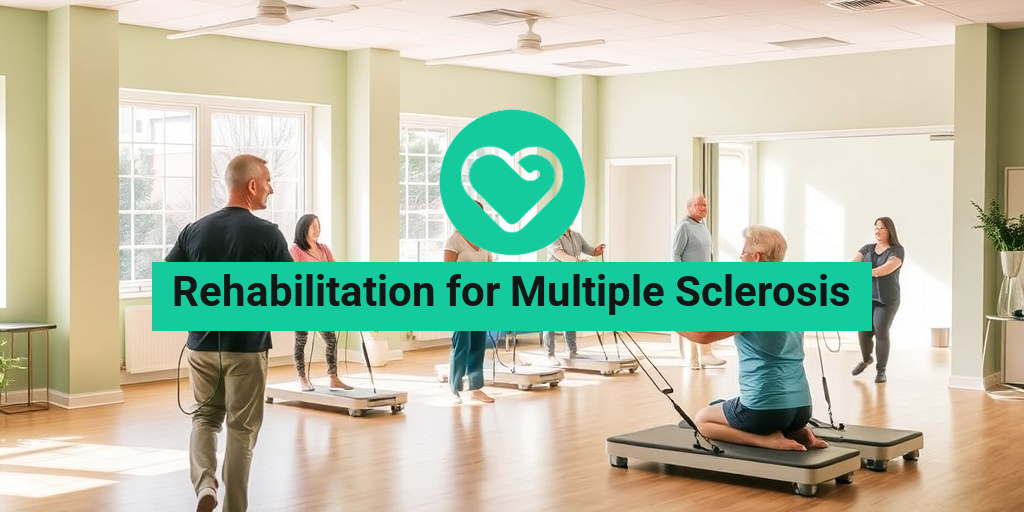What Is Multiple Sclerosis?
Multiple Sclerosis (MS) is a chronic autoimmune disease that affects the central nervous system (CNS), which includes the brain and spinal cord. In MS, the immune system mistakenly attacks the protective covering of nerve fibers, known as myelin. This damage disrupts communication between the brain and the rest of the body, leading to a variety of symptoms that can vary widely from person to person.
While the exact cause of MS remains unclear, it is believed to involve a combination of genetic and environmental factors. MS is more common in women than men and typically manifests between the ages of 20 and 40. Understanding MS is crucial for effective rehabilitation for multiple sclerosis, as it helps patients and caregivers navigate the complexities of this condition.
Types of Multiple Sclerosis
There are several types of MS, each with distinct characteristics:
- Relapsing-Remitting MS (RRMS): This is the most common form, characterized by clear episodes of neurological symptoms (relapses) followed by periods of recovery (remissions).
- Secondary Progressive MS (SPMS): Initially starts as RRMS but eventually transitions to a phase where the disease steadily worsens.
- Primary Progressive MS (PPMS): This type involves a gradual worsening of symptoms from the onset, without distinct relapses or remissions.
- Progressive-Relapsing MS (PRMS): A rare form that features a steady progression of symptoms with occasional relapses.
Symptoms of Multiple Sclerosis
The symptoms of MS can vary greatly among individuals and may change over time. Some people may experience mild symptoms, while others may face significant challenges. Here are some common symptoms associated with multiple sclerosis:
Physical Symptoms
- Fatigue: One of the most common and debilitating symptoms, fatigue can significantly impact daily activities.
- Muscle Weakness: Weakness in the limbs can make mobility difficult and may lead to falls.
- Spasticity: Muscle stiffness and spasms can occur, affecting movement and comfort.
- Coordination and Balance Issues: Many individuals with MS experience difficulty with coordination and balance, increasing the risk of falls.
Neurological Symptoms
- Numbness and Tingling: Many people report sensations of numbness or tingling, often in the limbs.
- Vision Problems: Blurred or double vision, as well as partial or complete loss of vision, can occur due to optic neuritis.
- Cognitive Changes: Some individuals may experience difficulties with memory, attention, and problem-solving.
Emotional and Psychological Symptoms
- Depression and Anxiety: The emotional toll of living with MS can lead to feelings of sadness and anxiety.
- Changes in Mood: Mood swings and irritability are also common among those with MS.
Recognizing these symptoms is essential for early diagnosis and effective rehabilitation for multiple sclerosis. Treatment options, including physical therapy for multiple sclerosis, can help manage symptoms and improve quality of life.
For those seeking more information on managing MS and exploring treatment options, resources like Yesil Health AI can provide evidence-based health answers tailored to individual needs. Remember, early intervention and a comprehensive rehabilitation plan can make a significant difference in living well with multiple sclerosis. 🌟

Causes and Risk Factors
Multiple Sclerosis (MS) is a complex neurological condition that affects the central nervous system, leading to a variety of symptoms that can significantly impact daily life. Understanding the causes and risk factors associated with MS is crucial for early detection and effective management.
Genetic Predisposition
Research indicates that genetics play a role in the development of MS. Individuals with a family history of the disease are at a higher risk. While no single gene has been identified as the cause, certain genetic markers may increase susceptibility. If you have a close relative with MS, it’s essential to be aware of the potential risks.
Environmental Factors
Environmental influences are also significant in the onset of MS. Factors such as geographic location, vitamin D levels, and exposure to certain viruses may contribute to the risk. For instance, people living in northern latitudes, where sunlight exposure is limited, tend to have higher rates of MS. Additionally, viral infections, particularly those caused by the Epstein-Barr virus, have been linked to the development of MS.
Immune System Dysfunction
MS is classified as an autoimmune disease, meaning the body’s immune system mistakenly attacks its own tissues. In the case of MS, the immune system targets the myelin sheath, which protects nerve fibers. This damage disrupts communication between the brain and the rest of the body, leading to various neurological symptoms.
Other Risk Factors
- Age: MS is most commonly diagnosed between the ages of 20 and 40.
- Gender: Women are more likely to develop MS than men, with a ratio of approximately 2:1.
- Smoking: Tobacco use has been associated with an increased risk of developing MS.
- Obesity: Higher body mass index (BMI) during adolescence may increase the risk of MS.
Understanding these causes and risk factors can empower individuals to take proactive steps in monitoring their health and seeking early intervention if necessary. 🧠
Importance of Rehabilitation
Rehabilitation for Multiple Sclerosis is a vital component of managing the disease and improving the quality of life for those affected. The rehabilitation process focuses on enhancing physical function, managing symptoms, and promoting overall well-being.
Enhancing Physical Function
One of the primary goals of rehabilitation is to improve physical function. This can include physical therapy for multiple sclerosis, which helps patients regain strength, balance, and coordination. Tailored exercise programs can significantly enhance mobility and reduce fatigue, allowing individuals to engage more fully in daily activities.
Managing Symptoms
MS can lead to a range of symptoms, including fatigue, pain, and cognitive difficulties. Rehabilitation programs often incorporate strategies to manage these symptoms effectively. Techniques such as occupational therapy can help individuals adapt their environments and routines to minimize challenges. Additionally, cognitive rehabilitation can assist in addressing memory and concentration issues, making daily tasks more manageable.
Emotional and Psychological Support
Living with MS can be emotionally taxing. Rehabilitation often includes psychological support to help individuals cope with the emotional challenges of the disease. Support groups, counseling, and stress management techniques can provide essential resources for emotional well-being. Connecting with others who understand the journey can be incredibly beneficial. 💬
Promoting Independence
Rehabilitation aims to empower individuals with MS to maintain their independence for as long as possible. By focusing on functional abilities and providing adaptive strategies, rehabilitation can help patients navigate their daily lives with confidence. This empowerment is crucial for enhancing self-esteem and overall quality of life.
Holistic Approach to Treatment
Rehabilitation for Multiple Sclerosis is not just about physical recovery; it encompasses a holistic approach to treatment. This includes addressing nutritional needs, lifestyle modifications, and alternative therapies. Integrating these elements can lead to a more comprehensive management plan that supports both physical and mental health.
In conclusion, the importance of rehabilitation in managing Multiple Sclerosis cannot be overstated. By focusing on enhancing physical function, managing symptoms, providing emotional support, and promoting independence, rehabilitation plays a crucial role in improving the quality of life for those living with MS. 🌟

Types of Rehabilitation Therapies
Rehabilitation for Multiple Sclerosis (MS) is a crucial aspect of managing the disease and improving the quality of life for those affected. Various rehabilitation therapies can help individuals with MS regain independence, enhance mobility, and manage symptoms effectively. Here, we explore the different types of rehabilitation therapies available for MS patients.
1. Physical Therapy
Physical therapy is one of the most common rehabilitation therapies for individuals with MS. It focuses on improving mobility, strength, and overall physical function. Physical therapists work with patients to develop personalized exercise programs that address their specific needs and limitations. This may include:
- Strength training to build muscle and improve endurance
- Balance and coordination exercises to reduce the risk of falls
- Stretching routines to enhance flexibility and reduce stiffness
Physical therapy can also help manage fatigue, a common symptom of MS, by promoting energy conservation techniques and encouraging regular physical activity. 🏋️♂️
2. Occupational Therapy
Occupational therapy aims to help individuals with MS perform daily activities more effectively. Occupational therapists assess the patient’s home and work environments, providing recommendations for modifications that can enhance independence. This may include:
- Adaptive equipment to assist with daily tasks
- Energy conservation strategies to manage fatigue
- Techniques to improve fine motor skills for tasks like writing or buttoning shirts
By focusing on functional abilities, occupational therapy empowers individuals to maintain their independence and engage in meaningful activities. 🏡
3. Speech Therapy
For some individuals with MS, speech therapy can be beneficial, especially if they experience difficulties with communication or swallowing. Speech therapists work on:
- Improving speech clarity and articulation
- Enhancing cognitive-communication skills
- Addressing swallowing difficulties through specific exercises
Effective communication is vital for social interaction and emotional well-being, making speech therapy an essential component of rehabilitation for MS. 🗣️
4. Cognitive Rehabilitation
Cognitive rehabilitation focuses on addressing cognitive challenges that may arise due to MS, such as memory issues, attention deficits, and problem-solving difficulties. This therapy involves:
- Memory exercises to enhance recall
- Strategies to improve attention and concentration
- Problem-solving tasks to boost cognitive flexibility
By improving cognitive function, individuals can better manage daily tasks and maintain their quality of life. 🧠
5. Psychological Support
Living with MS can be emotionally challenging, making psychological support an essential part of rehabilitation. Mental health professionals can provide:
- Counseling to address feelings of anxiety and depression
- Support groups to connect with others facing similar challenges
- Stress management techniques to cope with the emotional toll of the disease
Addressing mental health is crucial for overall well-being and can significantly impact the effectiveness of other rehabilitation therapies. 💬
Physical Therapy for MS
Physical therapy for Multiple Sclerosis is a cornerstone of rehabilitation, designed to help patients manage their symptoms and improve their physical capabilities. This therapy is tailored to the unique challenges faced by individuals with MS, focusing on enhancing mobility, strength, and overall function.
Benefits of Physical Therapy
Engaging in physical therapy offers numerous benefits for those living with MS, including:
- Improved Mobility: Targeted exercises can help increase range of motion and reduce stiffness, making it easier to move around.
- Enhanced Strength: Strength training can counteract muscle weakness, which is common in MS patients.
- Better Balance: Balance exercises can help prevent falls, a significant concern for individuals with MS.
- Fatigue Management: Regular physical activity can help combat fatigue, allowing individuals to engage more fully in daily life.
Types of Exercises in Physical Therapy
Physical therapists may incorporate various types of exercises into a rehabilitation program, including:
- Aerobic Exercises: Activities like walking, cycling, or swimming can improve cardiovascular health and endurance.
- Strength Training: Using resistance bands or weights to build muscle strength.
- Flexibility Exercises: Stretching routines to maintain flexibility and reduce muscle tightness.
- Balance Training: Exercises that focus on stability and coordination, such as standing on one leg or using balance boards.
Physical therapy for MS is not a one-size-fits-all approach; it is essential to work closely with a qualified physical therapist who understands the complexities of the disease. Together, they can create a personalized plan that addresses individual goals and challenges. 💪

Occupational Therapy Benefits
Occupational therapy (OT) plays a crucial role in rehabilitation for multiple sclerosis (MS), helping individuals regain independence and improve their quality of life. This therapeutic approach focuses on enabling patients to perform daily activities that may have become challenging due to their condition.
Enhancing Daily Living Skills
One of the primary goals of occupational therapy is to enhance daily living skills. Therapists work with patients to develop strategies that make everyday tasks more manageable. This can include:
- Adaptive Techniques: Learning new ways to perform tasks, such as using specialized utensils for eating or tools for dressing.
- Energy Conservation: Teaching patients how to manage fatigue by pacing themselves and prioritizing activities.
- Home Modifications: Suggesting changes to the home environment, like installing grab bars or rearranging furniture for easier access.
Improving Physical Function
Occupational therapists also focus on improving physical function, which is vital for maintaining independence. They may incorporate:
- Strength Training: Exercises designed to build strength in specific muscle groups affected by MS.
- Coordination Activities: Tasks that enhance hand-eye coordination and fine motor skills.
- Balance Training: Techniques to improve stability and reduce the risk of falls.
Boosting Cognitive Skills
MS can affect cognitive functions, making it challenging for individuals to concentrate or remember tasks. Occupational therapy can help by:
- Memory Aids: Introducing tools like planners or digital reminders to assist with memory.
- Problem-Solving Strategies: Teaching techniques to approach tasks methodically and reduce frustration.
- Mindfulness Practices: Encouraging mindfulness and relaxation techniques to enhance focus and reduce anxiety.
Social Participation and Engagement
Engagement in social activities is essential for emotional well-being. Occupational therapists encourage participation in community activities, hobbies, and social gatherings, which can help combat feelings of isolation often experienced by those with MS. This can include:
- Group Therapy Sessions: Facilitating group activities that promote social interaction.
- Volunteer Opportunities: Encouraging involvement in local organizations or charities.
- Hobby Exploration: Helping patients discover new interests that can be pursued at home or in community settings.
Emotional Support and Counseling
Living with multiple sclerosis can be emotionally taxing, making emotional support and counseling an integral part of the rehabilitation process. Addressing the psychological aspects of MS is just as important as managing physical symptoms.
Understanding the Emotional Impact of MS
Many individuals with MS experience a range of emotions, including frustration, sadness, and anxiety. Understanding these feelings is the first step toward effective management. Counseling can provide a safe space for patients to express their emotions and learn coping strategies.
Therapeutic Approaches
Various therapeutic approaches can be beneficial for individuals with MS:
- Cognitive Behavioral Therapy (CBT): This approach helps patients identify negative thought patterns and replace them with positive ones, improving overall mental health.
- Support Groups: Joining a support group allows individuals to connect with others facing similar challenges, fostering a sense of community and shared understanding.
- Mindfulness and Relaxation Techniques: Practices such as meditation and deep breathing can help reduce stress and improve emotional resilience.
Family Involvement
Involving family members in the counseling process can enhance emotional support. Family therapy sessions can help loved ones understand the challenges faced by the individual with MS, fostering empathy and improving communication.
Accessing Resources
Finding the right emotional support resources is crucial. Patients can seek help from:
- Licensed Therapists: Professionals who specialize in chronic illness and can provide tailored support.
- Online Counseling Services: Virtual therapy options that offer flexibility and accessibility.
- Local MS Societies: Organizations that often provide resources, support groups, and counseling services specifically for those with MS.
Incorporating emotional support and counseling into the rehabilitation process can significantly enhance the overall well-being of individuals living with multiple sclerosis, helping them navigate the complexities of their condition with greater ease and resilience. 🌈

Frequently Asked Questions about Rehabilitation for Multiple Sclerosis
What is Rehabilitation for Multiple Sclerosis?
Rehabilitation for Multiple Sclerosis is a comprehensive approach designed to help individuals manage their symptoms and improve their quality of life. It typically includes physical therapy, occupational therapy, and other supportive services aimed at enhancing mobility, strength, and daily functioning.
How can physical therapy help with Multiple Sclerosis?
Physical therapy for multiple sclerosis focuses on improving mobility, strength, and coordination. Therapists create personalized exercise programs that can help reduce fatigue, enhance balance, and alleviate muscle stiffness, ultimately leading to a better quality of life.
What types of treatments are available for Multiple Sclerosis symptoms?
There are various treatment options for multiple sclerosis symptoms, including:
- Medications to manage flare-ups and slow disease progression
- Physical therapy to improve mobility and strength
- Occupational therapy to assist with daily activities
- Psychological support to address emotional challenges
Are there specific rehabilitation programs for Multiple Sclerosis in India?
Yes, there are specialized rehab programs for multiple sclerosis available in India. Many hospitals and rehabilitation centers offer tailored programs that include physical therapy, occupational therapy, and counseling to support individuals with MS.
What should I look for in a physical therapy provider for Multiple Sclerosis?
When searching for physical therapy for multiple sclerosis near you, consider the following:
- Experience and specialization in neurological conditions
- Personalized treatment plans
- Positive patient reviews and outcomes
- Accessibility and location
Can rehabilitation help during a Multiple Sclerosis flare-up?
Yes, rehabilitation during a multiple sclerosis flare can be beneficial. A tailored rehabilitation program can help manage symptoms, improve function, and provide support during challenging times.
What are the side effects of treatments for Multiple Sclerosis?
While treatments for multiple sclerosis can be effective, they may also come with side effects. Common side effects include:
- Fatigue
- Nausea
- Headaches
- Muscle weakness
It’s essential to discuss any concerns with your healthcare provider to find the most suitable treatment plan.
How can I find support for living with Multiple Sclerosis?
Support groups and online communities can be invaluable for individuals living with MS. Connecting with others who share similar experiences can provide emotional support and practical advice. Look for local or online groups dedicated to multiple sclerosis to find a community that resonates with you. 🌍




